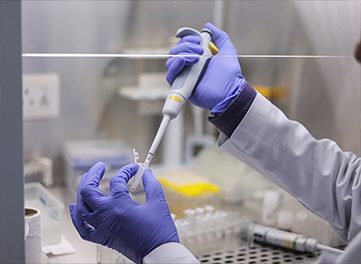MYTHS & FACTS
Myths & Facts
Myth: The Trial will treat me like a guinea pig.
Fact: You will not be a guinea pig, but it’s true that the objective of any clinical trial is to answer a important medical question. There are some extra activities or certain additional tests which you may have to undergo during your participation in the clinical trial. This is done under excellent care provided while you are in the study. Every trial requires that the participants voluntarily agree to take part in a particular trial research. That agreement is called “informed consent.” Informed consent includes a comprehensive document that gives all aspects of the trial that are relevant for provides all of the information necessary for participants to decide (or decline) to take part in the trial.

The informed consent document explains the objective of the study, describes participant visits and clinical activities to be performed at these visits and potential risks and benefits. Informed consent is documented by means of a written, signed, and dated informed consent form
All trial participants are treated honestly and ethically. There are strict guidelines which are being followed to ensure participant’s rights, safety and well-being.
Myth: Will I receive a placebo and not actual drug if I participate.
Fact: A placebo is an inactive substance visually identical in appearance to a drug being tested in a clinical trial.
Placebos are only used in cancer clinical trials if there are no other treatments available for the cancer type, so that researchers can compare new medication with the placebo to prove that the treatment is better than nothing at all.
In cancer trials, the best available treatment (called the “standard of care”) is used rather than placebos. More often than not, an investigational drug or a placebo is given in addition to the standard of care drugs for that particular cancer.
Myth: I cannot change my mind after enrolling in a clinical trial.
Fact: Participating in a clinical trial is always voluntary. If at any time you decide that you no longer wish to participate in a trial, you may withdraw without any penalty and without compromising on your treatment outside the trial.
Myth: The use of new and unproven methods and medicines in clinical trials makes them dangerous.
Fact: There is some level of risk associated with clinical trials, since they are experiments and are designed to answer a critical question. However, participants in clinical trial only receive investigational drug after extensive testing has been performed on them.
Safety of participants is always the first priority. Before they begin, all clinical trials are reviewed by our institutional review board (IRB), which is made up of doctors, scientists, legal and community members who decide if the trial is safe and ethical to conduct.
The IRB does not just approve the study once at the beginning. All the data generated in the trial is constantly reviewed. If there is a safety concern, the study is stopped and scrutinized to see if any changes are needed to continue or the study should be stopped.
Myth: I won’t benefit from being in a clinical trial.
Fact: Participating in a clinical trial could possibly provide benefits that could improve your quality of life. For example, you may have an exclusive opportunity to receive new and effective treatments which are not available to patients outside of the trial, receive focused health care for your particular condition or learn more about your disease.
Also by participating in clinical trials, patients are not only evaluates new treatments for their medical conditions but also contributes to advancing medical science and helping more people live longer and healthier lives.
Myth: The cost of participating in a clinical trial is high
Fact: Every clinical trial is different. In some clinical trials, all study related procedures are free of cost. Some will reimburse associated travel costs as well. Still, there may be costs associated with participating, so contact your trial site for information pertaining to a particular trial of interest.
Myth: I will have to release all my personal health information as part of a clinical trial
Fact: In clinical trials, sharing certain information is necessary to check your eligibility and to make the right decisions. Maintaining your privacy and ensuring your data is shared responsibly is of utmost importance. All your personal data such as your name or address or any other unique identification are not disclosed and remains in a coded form.
All clinical trials comply and operate under relevant laws in relation to the protection of the personal data of Subjects and all your personal information will be protected in compliance with these laws and in the manner explained in the informed consent document prior to your participation in the trial.